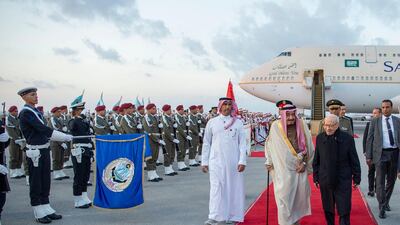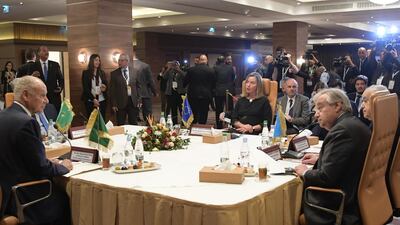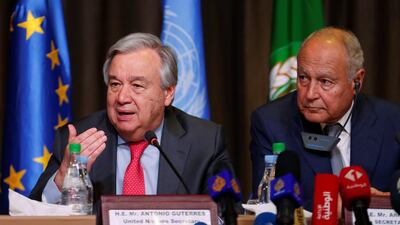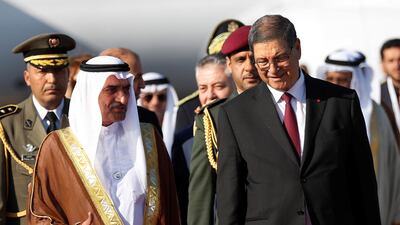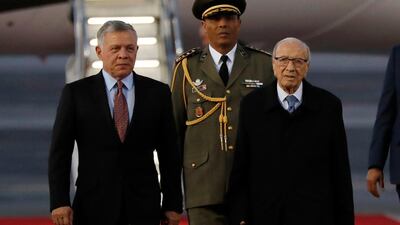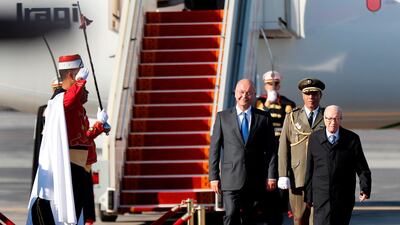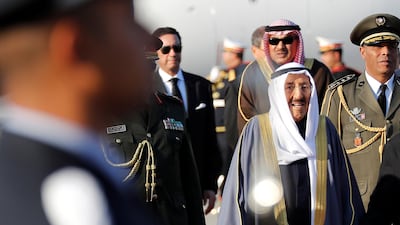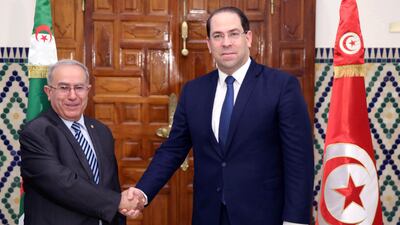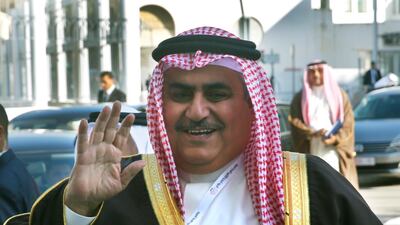Throughout the Tunisian capital, streets have been cleaned, flags of the 22 delegations attending the summit – along with UN Secretary General Antonio Guterres – have gone up to line the roads from the airport to the building where the summit will be held.
Across the country, police and soldiers have been deployed in large numbers, overseeing the week-long preparations, with ministers meeting in advance of the Summit to try to establish some form of consensus on the variety of issues facing the region.
Saudi Arabia's King Salman received a warm welcome on Friday as he arrived ahead of the summit to meet with the Tunisian government. Accompanied by a large delegation that includes Saudi Interior Minister Prince Abdulaziz bin Saud bin Naif bin Abdulaziz, Foreign Minister Ibrahim Al Assaf, Finance Minister Mohammed Al Jadaan and Commerce and Investment Minister Majed Al Qasabi, the king was welcomed by Tunisian President Beji Caid Essebsi.
Sheikh Hamad bin Mohammed Al Sharqi, the Ruler of Fujairah, will lead the UAE delegation and join leaders from across the region to discuss a range of the issues facing the Arab World. A priority will be the recent US support for Israeli claims to the occupied Golan Heights in Syria, as well as the continued suspension of Syria from the league it helped found. Also on the agenda are developments in war-torn Libya, Yemen and Sudan, as well as Iran's growing influence across much of the region.
Also in attendance will be Qatari Emir Sheikh Tamim Bin Hamad Al Thani. This is the first time the two leaders have attended the same conference since the dispute of 2017 saw Gulf states cut ties with the peninsular kingdom, accusing Doha of supporting terror groups and destabilising the region.
Several Arab leaders will not be attending for reasons of their own. As was widely expected, embattled Algerian President Abdelaziz Bouteflika will not attend as the now six weeks of protests against his continued rule show no signs of abating. Mohamed VI of Morocco, who is hosting the Pope, will also miss the meeting as well as Egypt’s Abdel Fattah El Sisi. Also failing to make the trip to Tunis will be Sudanese leader Omar Al Bashir who is also facing mass protests against his rule His invitation sparked an outcry from rights groups within Tunisia.
While expectations for the summit are limited, a condemnation of US support for Israeli claims to the Golan Heights is widely anticipated. Referencing the administration of Donald Trump’s decision to recognise Tel Aviv’s claims to the disputed territory along the country’s Syrian border, Tunisia’s foreign minister Khemaies Jhinaoui told reporters on Friday that there would be a response.
“We will work with fellow Arab countries and the international community to contain the expected repercussions of this decision in the various regional and international forums,” he said, without elaborating further.
While the summit is not expected to lift the suspension of Syria’s membership, frozen in 2011 following the bloody crackdown on mass demonstrations that led to the now more than eight-year civil war, the US decision does at least provide the Assad regime with room for manoeuvre. “It certainly gives Assad an opening to get himself readmitted. mainly because now he can play the aggrieved party in an issue about which the Arab world is totally united,” Fred Hof, a senior fellow at the Atlantic Council’s Rafik Hariri Center for the Middle East, said this week.
While the gains for Damascus may be mixed, for Tunisia, hosting the Arab League meeting remains significant. "…the Summit at least highlights its role as a stable, centrist state with solid pan-Arab credentials," David Pollock, a Fellow at The Washington Institute, told The National. "Beyond that symbolic benefit, Tunisia may reap some modest, short-lived economic rewards from some of the wealthy Gulf guests."
With presidential elections slated for Tunisia later this year, the presence of both King Salman and Sheikh Tamim at the summit could help the 92-year old Mr Essebsi.
Further to the immediate diplomatic gains of hosting the summit, bringing such a high profile roster of Arab leaders together is also unlikely to trouble Tunisia’s campaign to secure one of the rotating seats on the UN’s Security Council. However, the still unexplained arrest of UN diplomat and Tunisian national, Moncef Kartas at Tunis Carthage airport on Tuesday evening threatens a rift with the international body that could yet damage the country’s campaign for the seat.
Beset by internal division and local rivalries, what impact the Summit may have on the region's long term development is still to be seen. "The Arab League has for a long time now been reduced to a ceremonial role as its members are bitterly divided over a number of issues, such as the conflicts in Yemen and Syria and the Qatar crisis," Lina Khatib, head of the Middle East and North Africa programme at Chatham House told The National.
